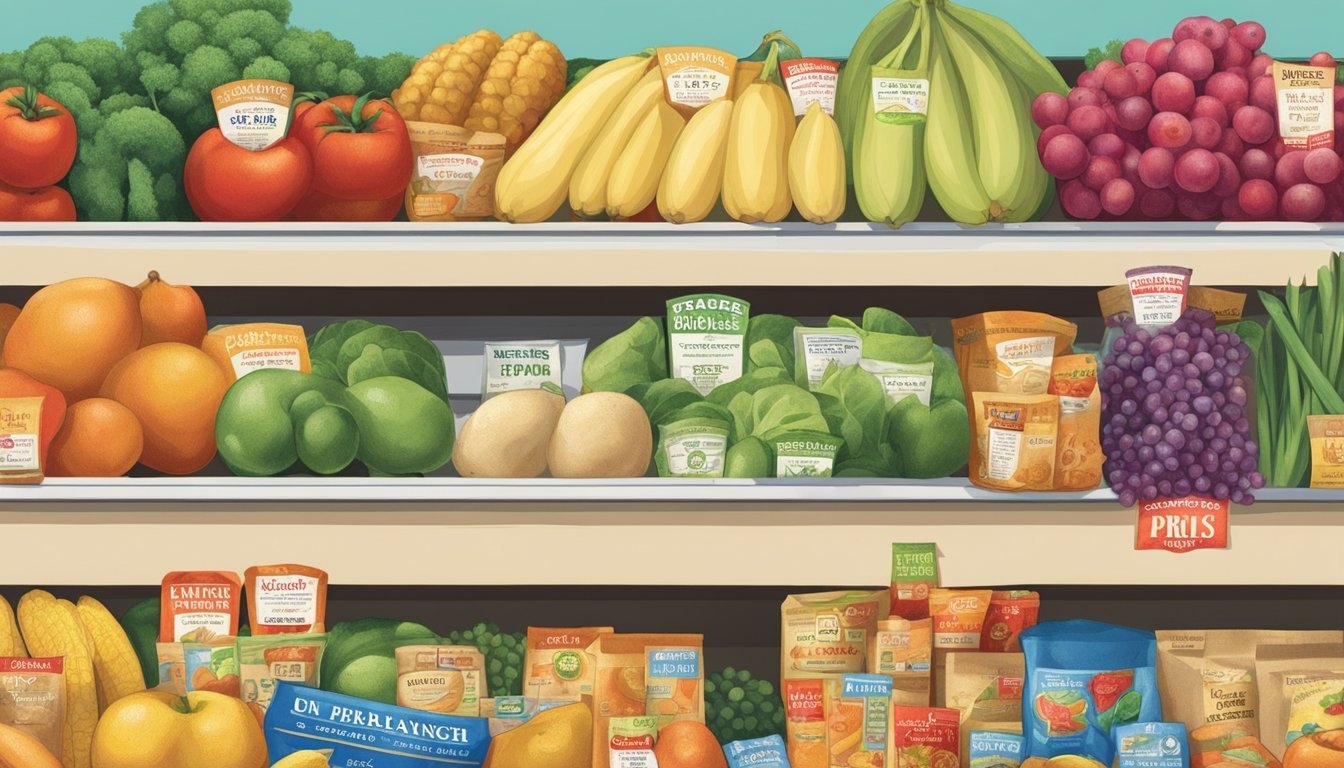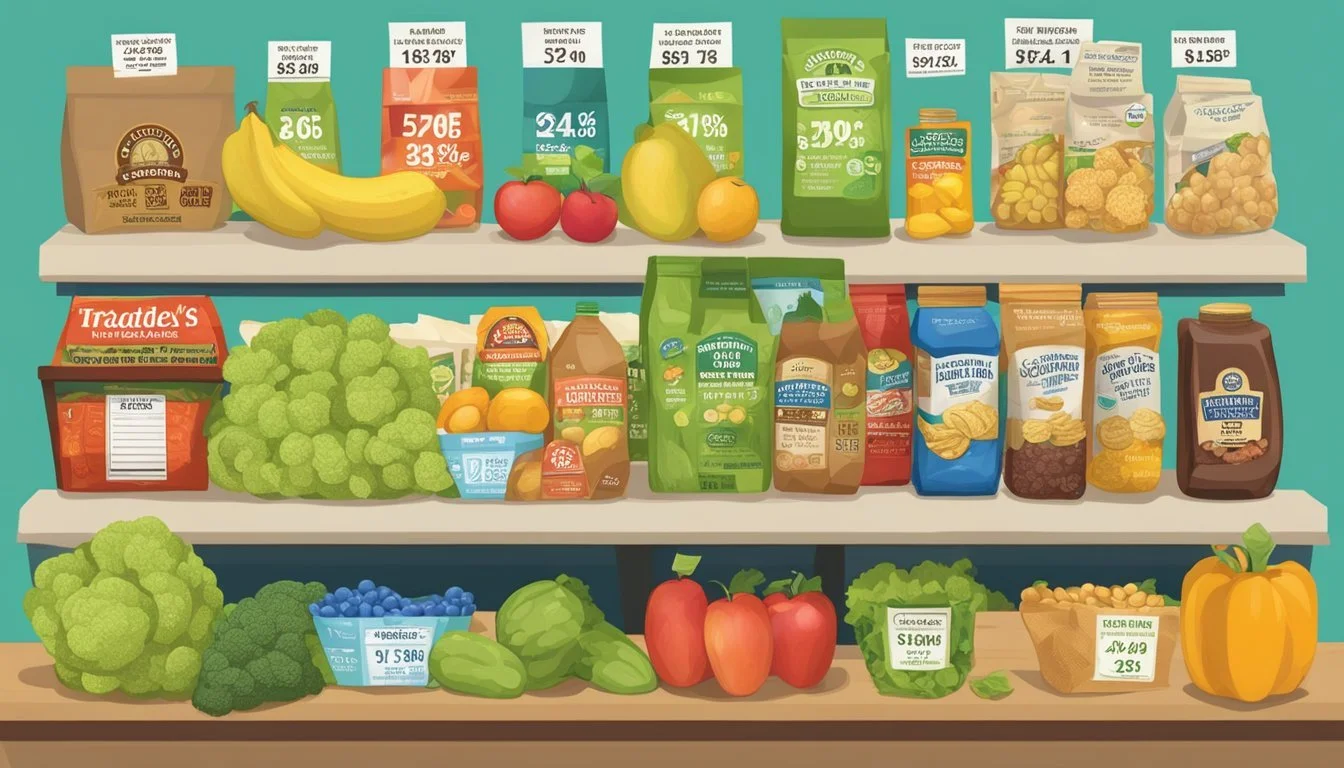Is Trader Joe's Cheaper Than Food Lion?
Comparing Grocery Prices
Part of Our Grocery Store Guide with Details on Trader Joe's Prices and Food Lion Prices
When consumers are looking for value and savings in their grocery shopping experience, the choice of supermarket can make a significant difference. Trader Joe’s, known for its quirky branding and unique product offerings, competes with traditional grocery retailers like Food Lion, vying for customers who prioritize affordability without compromising quality. Comparative shopping studies suggest that Trader Joe's frequently offers lower prices on a variety of items. Their products, often organic and private label, are pitted against the familiar national and store brands at Food Lion, which operates with a different business model that includes a wider selection of national brands.
The concept of "cheapness" isn't only about the price tag; it also relates to quality and value. At Trader Joe's, the emphasis on private-label goods ensures that customers often enjoy lower prices, but the variety might be limited compared to competitors. Food Lion, on the other hand, may have more promotions or deals on national brands but might not match Trader Joe's baseline prices. The competition between these two stores highlights a consumer trade-off between variety and potentially higher cost at Food Lion, versus the sometimes lower cost and curated selection at Trader Joe's.
However, purely focusing on price does not provide the complete picture as individual shopping habits, regional price variations, and specific product choices all play a role in determining the best value for money. A detailed comparison reveals that for staples and certain categories like spices, nuts, and freezer items, Trader Joe’s tends to have the edge in savings, but broader shopping needs might sway some customers towards Food Lion’s more diverse offerings. The true measure of each store’s cost-effectiveness depends on the shoppers’ preferences and the range of items they need.
Overview of Trader Joe's and Food Lion
Trader Joe's is a national chain of neighborhood grocery stores in the United States. It is revered for its curated selection of products, many of which are marketed under its own private labels. Trader Joe's prioritizes high-quality and value-for-money items, offering a significant range of organic and gourmet food options appealing to health-conscious customers. With its vibrant, nautical-themed stores, Trader Joe's provides a unique shopping experience that differentiates it from traditional supermarkets.
On the other hand, Food Lion is a regional grocery store chain operating primarily in the Southeastern and Mid-Atlantic states. It is a subsidiary of Ahold Delhaize, a retail group based in the Netherlands. Food Lion focuses on providing affordability, convenience, and a broad selection of both national brands and private label products, with an increasing emphasis on fresh and organic options.
Both retailers have cultivated loyal customer bases through their distinct retail strategies:
Trader Joe's is known for:
Unique Products: Often introducing exclusive, sometimes quirky food items.
Friendly Staff: Recognized for well-informed and personable employees.
Organic and Specialty Selections: Wide array of niche, healthy, and organic choices.
Food Lion offers:
Affordability: Competitive pricing on staple and household items.
Local Convenience: Many locations for easy access for customers.
Promotions: Regular discounts and loyalty program benefits.
While Trader Joe's operates with a focus on the experience and quality of exclusive products, Food Lion competes largely on convenience and price point, aimed at serving the day-to-day needs of its customers.
Pricing Strategies
In comparing the pricing strategies of Trader Joe's and Food Lion, one must consider their differing approaches to pricing, which are deeply rooted in their respective brand philosophies. Both aim to provide value, though their methods to achieve this vary.
Trader Joe's Pricing Philosophy
Trader Joe's is recognized for its value-based pricing model. The store emphasizes products that are not only inexpensive but also of high quality relative to the cost. Their strategy involves private label goods which they procure often through direct deals with suppliers, allowing them to forgo the middleman costs. This permits Trader Joe's to offer lower prices on many items, particularly on pantry staples, and organic and specialty products. Trader Joe's seldom offers coupons or discounts, relying instead on everyday low prices which can yield savings for the budget-conscious shopper.
Food Lion Pricing Strategy
Food Lion's approach to pricing involves competitive pricing strategies tailored to cater to a broad customer base. They provide weekly specials, along with promotional discounts and loyalty card savings aimed at delivering cost savings. Food Lion shoppers can also benefit from digital coupons that can be loaded onto their loyalty cards, optimizing their ability to save money on purchases. Food Lion positions itself as a community-focused retailer, offering a range of price points to cater to various demographics, making it a go-to place for shoppers looking for deals to fit their budget.
By maintaining a comprehensive selection of brands and focusing on cost-saving promotions, Food Lion ensures its customers can find products that align with both their tastes and their financial constraints.
Product Selection Comparison
Both Trader Joe's and Food Lion offer a range of products that cater to the grocery needs of their customers. Each store has its strengths, particularly when it comes to the diversity of their offerings and the availability of store-brand products.
Trader Joe's Product Range
Trader Joe's is noted for its carefully curated product selection that prominently features its own store brand. Shoppers will find a variety of organic foods, including fresh produce and a selection of unique grocery items that are often exclusive to Trader Joe's stores. The store's focus on quality is evident in staples like their flour tortillas and popular snacks. They also boast an impressive lineup of popular frozen items such as their revered French vanilla ice cream. Trader Joe's commitment to quality extends to its selection of organic food items, which are frequently rotated to maintain freshness and ensure variety.
Food Lion's Available Products
Food Lion offers a broader selection of both store brand and national brands across its shelves. Customers have access to an extensive array of products, from basic grocery items and staples to fresh produce. When it comes to organic foods, Food Lion has steadily increased its offerings to meet consumer demand. The store brand products often provide a less expensive alternative to name brands without compromising on quality. With a larger footprint, Food Lion is able to offer more in terms of selection, including readily available favorites like flour tortillas and French vanilla ice cream which cater to a wide consumer base.
Quality and Brand Comparison
When considering shopping at Trader Joe's or Food Lion, one must take into account the quality of the store brands they offer and how they stack up against national brands.
Store Brands
Trader Joe's has established itself uniquely in the marketplace with its private label products, which account for approximately 80% of its inventory. These store brands are known for their quality, which consumers often perceive to rival that of national brands. Trader Joe's eliminates the middleman by sourcing products directly from suppliers and often requires these vendors to adhere to their specific quality guidelines.
Quality: Known for high-quality and unique offerings
Products: Diverse range with many organic and gourmet options
Pricing: Generally offers lower prices due to direct supplier partnerships
Food Lion, on the other hand, offers its own set of store brands, such as "SE Grocers." Although not as exclusively private label-focused as Trader Joe's, Food Lion's store brands are typically priced around 20% cheaper than national brands, providing a cost-effective alternative to customers while still maintaining a commendable level of quality.
Quality: Competitive quality at a lower price point
Products: Frequently include everyday grocery items
Pricing: Affordably positioned to provide value to customers
National Brands
Regarding national brands, both Trader Joe's and Food Lion carry a selection, although the assortment at Food Lion is more extensive due to Trader Joe's emphasis on its own branded goods. Consumers might find a greater range of familiar names and products at Food Lion, which can influence one's perception of quality and variety.
Trader Joe's: Limited national brands available
Food Lion: Broader selection of national brand products
Shoppers often infer product quality from the reputations of the national brands they are accustomed to buying. Both Trader Joe's and Food Lion maintain relationships with these brands, although the scale and emphasis differ between the two retailers.
Price Analysis of Essential Items
In comparing the cost of essential items at Trader Joe's with Food Lion, one can identify which retailer offers better value on everyday necessities. This section focuses on the specifics within the categories of meat and poultry, dairy products, fresh produce, and packaged goods.
Meat and Poultry
Trader Joe's offers competitive pricing on chicken breast and ground beef, yet Food Lion occasionally provides less expensive options, especially during sales. For example, Food Lion may offer chicken breast at $1.99 per pound during a promotion, whereas Trader Joe’s regular price might hover around $2.69 per pound. The pricing for bacon and salmon shows a similar pattern, with Trader Joe's typically presenting a consistent, but sometimes higher price point.
Dairy Products
Dairy items like milk, cheese, and eggs show a clear price advantage at Trader Joe's. A gallon of milk can cost around $2.29 at Trader Joe's and $2.59 at Food Lion. Cheddar cheese is another item where Trader Joe's tends to be more cost-effective, often priced at $3.99 for a pound compared to Food Lion's cost that may reach $4.59 for the same quantity.
Fresh Produce
Trader Joe's is known for its organic produce selection, which is competitively priced. Basic produce like bananas can be cheaper at Trader Joe's, costing roughly $0.19 per banana against Food Lion's approximate price of $0.25. However, the price for non-organic produce may be less expensive at Food Lion, giving shoppers on a budget an edge.
Packaged Goods
In the realm of packaged goods, including spaghetti, cereal, coffee, bread, peanut butter, pasta, chicken broth, and english muffins, Trader Joe's typically presents cheaper alternatives due to its private-label brands. A container of Trader Joe's chicken broth might be priced at $1.29, whereas Food Lion's brand could cost $1.49. Packaged goods often show the most significant savings at Trader Joe's, provided shoppers are content with store-brand quality.
Cost Comparison in Different Categories
This section examines the price disparities across various categories between Trader Joe's and Food Lion, focusing on how factors like organic labelling, frozen assortments, and brand types influence cost.
Organic Versus Non-Organic
Trader Joe's tends to have competitively priced organic options which can be more affordable compared to Food Lion's organic products, particularly in the produce and dairy aisles. For example, Trader Joe's organic maple syrup might cost less per ounce compared to Food Lion's equivalent.
Frozen Food
In the frozen food section, Trader Joe's offers a diverse range of private label frozen items that generally undercut Food Lion, especially in terms of packaging efficiency and portion sizes. From frozen meat to ready-to-cook meals, the price margin can be significant.
Private Label Versus National Brands
Trader Joe's mostly stocks its shelves with private label grocery items and snacks, which allows them to offer lower prices than national brands available at Food Lion. The savings are well observed in staple categories such as dairy, produce, and canned goods.
Consumer Experiences and Loyalty
Consumer experiences and loyalty play crucial roles in distinguishing grocery chains. Trader Joe's has developed a loyal following by offering a distinct shopping experience that consistently receives high marks from customers.
Customer Service
Trader Joe's excels in customer service, a pivotal element in building customer loyalty. Surveys reveal that shoppers associate the brand with friendly staff and prompt assistance. This dedication to service contributes to a higher retention rate, as customers often feel a personal connection to the store and its employees.
Shopping Experience
The shopping experience at Trader Joe's is unique among its competitors, including Food Lion, due to its curated product selection and store layout. Unlike traditional grocery chains where services are designed to save money, Trader Joe's focuses on a more personal experience, with an array of exclusive store-brand products that encourage exploration and repeat visits. This strategy is apparent in their customer loyalty, with many customers favoring the experience over pure cost-savings alone.
Economic Factors Affecting Prices
When examining the pricing strategies of grocery stores like Trader Joe's and Food Lion, one must consider how the supply chain and marketing efforts influence the cost efficiency for the business and, consequently, price offerings to consumers.
Supply Chain
Trader Joe's maintains a simplified supply chain by purchasing directly from suppliers and often forgoing middlemen. This direct relationship allows Trader Joe's to negotiate better prices, which can be reflected in the lower costs of their products compared to competitors such as Food Lion. Additionally, by minimizing the number of vendors they work with and having a higher turnover of a select range of products, Trader Joe's efficiently manages inventory costs, thereby influencing its competitive pricing strategy.
Marketing and Advertising
Trader Joe's spends significantly less on marketing and advertising compared to many other grocery chains. They focus on word-of-mouth and their Fearless Flyer newsletter to communicate with customers, rather than expensive advertising campaigns. Food Lion and similar stores might allocate a larger part of their budget to traditional marketing, which can increase overall costs and influence the price points of their products.
Comparative Analysis of Additional Costs
When examining the cost differences between Trader Joe's and Food Lion, additional costs beyond the shelf price, such as membership fees and delivery options, factor into a consumer's overall budget.
Membership Fees
Trader Joe's does not offer a membership program, which means customers do not incur any membership fees while shopping there. Customers can expect a straightforward checkout process with no discounts tied to membership. In contrast, Food Lion offers an MVP Customer Rewards Program, which is free to join and provides members with discounts on various items. Although there is no monetary cost associated with the Food Lion MVP program, customers may benefit from exclusive discounts that could influence their total spend.
Delivery Options
The availability and cost of delivery services can significantly impact a consumer's shopping budget.
Trader Joe's: As of the current knowledge cutoff, Trader Joe's does not provide a store-sanctioned delivery service. Customers must rely on third-party services for delivery, where fees are variable and can be substantial depending on the service provider and order size.
Food Lion: Food Lion offers delivery services in partnership with Instacart. The cost of delivery for Food Lion items includes:
Delivery Fee: Typically starts at $3.99 for same-day orders over $35.
Service Fee: Varies and is determined by Instacart.
Annual Membership: Optional Instacart Express for $99, providing free delivery on orders over $35.
In sum, while Trader Joe's avoids the complexities of delivery costs by not offering the service directly, Food Lion customers have the opportunity to choose delivery options that can add to the overall cost, but also provide convenience. Amazon Prime membership is not directly relevant to Food Lion's service, but customers using third-party delivery for Trader Joe's might leverage an Amazon Prime membership if choosing to order through Amazon's marketplace where available.
Alternatives to Trader Joe's and Food Lion
When considering alternatives to Trader Joe's and Food Lion, shoppers have a multitude of grocery chains to choose from, each offering its own set of benefits and pricing structures.
Comparison with Other Grocery Chains
Aldi: Known for its cost-saving measures, Aldi offers competitive prices that often undercut other supermarket costs. It achieves this through a limited selection of mostly private label items and a no-frills shopping experience.
Wegmans: They provide a wide variety of quality goods with a focus on fresh products and excellent customer service. Prices may be higher compared to discount stores, but Wegmans often runs specials that provide value.
Costco: This bulk retailer requires a membership fee but offers significant savings for those buying in large quantities. Comparison with Trader Joe's shows Costco's lower per-unit pricing on many items.
Whole Foods: A supermarket for organic and health-oriented products, Whole Foods tends to have higher prices, but with Amazon's acquisition, Prime members can get discounts and deals.
Stop & Shop: Offering a more traditional grocery store experience, Stop & Shop presents weekly specials and savings for cardholders, though their prices can be higher than those of Trader Joe's on everyday items.
Target: Expands beyond a typical supermarket's offerings, including groceries. Target's prices on health food items are competitive and can be cheaper than some of Trader Joe's selections.
Walmart: With a broad national reach, Walmart offers low prices on a wide range of products. Their pricing is aggressive enough to be considered a strong competitor to both Trader Joe's and Food Lion.
Giant: A reliable supermarket chain that prides itself on quality goods. Their prices tend to vary with frequent promotions that provide competitive costs for savvy shoppers.
Amazon: Has entered the grocery market strongly, especially with the purchase of Whole Foods. Amazon offers convenience through online ordering and home delivery, but its prices can be higher than physical retail stores.
When consumers compare grocery chains, they weigh factors like product quality, selection, convenience, and pricing. Each retailer has advantages that might align with a shopper's preferences or needs.
Final Thoughts on Grocery Shopping and Budgeting
When assessing grocery shopping options, it's critical for consumers to remember that their ultimate goal is to balance quality with affordability. Chain stores like Trader Joe's and Food Lion offer different price points and product selections, influencing where shoppers may find the most value for their money.
They must evaluate the selection at each store, considering not only the price but also the quality of items such as fresh produce and store-brand products. They should take advantage of deals and savings opportunities by signing up for loyalty programs or downloading store apps, which can offer personalized discounts.
Consumers aiming to save money should consider the following strategies:
Create a budget: Know your spending limits before you enter the store.
Compare prices: Look at unit prices to find the best deals.
Buy in bulk: Purchase larger quantities of non-perishable items when they're on sale.
Use lists: Shop with a list to avoid impulse purchases.
At the end of the day, each household has unique needs and preferences. Choosing a grocery store should be about finding the right fit for one's budget and lifestyle. Whether it's Trader Joe's or Food Lion, savvy shoppers can manage their food expenses better by staying informed and proactive in their shopping habits.










